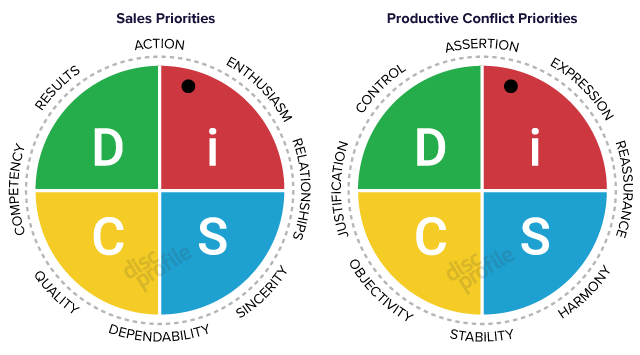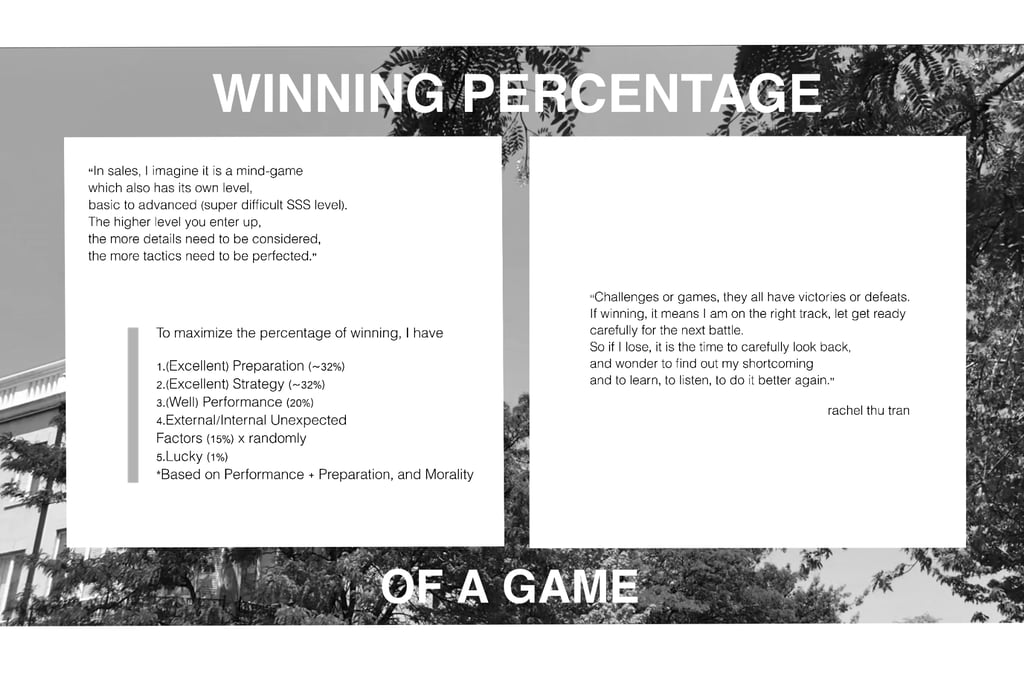my sales strat
2021-Present
“Rachel, I wonder to know why when you’re in cashier the daily Sale reports were amazing. Now I know, the customers all asked about you.”
Bahareh Matin Sadeghi, Aroma Espresso Bar Forest Hill
2022
“Without you, what I should be going to do Rachel? Without you, my gallery will be lack of bright ideas you brought to its window, and ofcourse the joys of people when you were here.”
“You kept me busy, Rachel. Your ideas for New Yorks and London artfares made most of the inventory were sold. You need to urge our artists that we need more.”
Joan Spence, SPENCE Gallery Harbord St
2019-2021
Translate - “Re-think about studying abroad, please stay. 5 people work together in District 1 Sales Team, but the revenues could not reach the peak as you work alone.”
Origin - “Hay đừng đi du học nữa, bạn ở lại làm tiếp cho tôi đi, 5 người thuộc đội Sales quận 1 mà doanh thu không đạt nổi đỉnh như bạn một mình gánh !”
Vivian Dang, The V Language Ho Chi Minh City
2019
Translate –“You’re just 19 but I can say it might be your talent, at first, I accepted you because of your major in Fashion, however, the final sales in your shifts made me look at you with different eyes”
Origin – “Giờ trẻ mà tài năng quá, hồi đầu chị chỉ nghĩ nhận em vì thấy em đam mê và học Thời trang, ai mà ngờ doanh thu hết hồn thật á !”
Trang Nguyen, Zara Viet Nam Ho Chi Minh City
All the information is true statements.
compliments from my superiors
I aspire to be a top-tier sales master, so this is the end result of 6 years of pursuing and learning about the sales profession.
Selling a small cup of coffee, English courses, clothes, and accessories, and
finally my own attitude and the environment I create for customers.
It's not perfect because there's always something new to learn, making you feel like a "new born and know nothing" child.
I need to learn more, and I hope to be able to perfect my technique to an almost perfect and understandable level later on.
“I do not sell on emotionally instinct, I do sell on the strategy outlined in my head” – Rachel Thu Tran
“First aim to know a service/product, then to a customer, thirdly my proper attitude/character to work. And finally, is KPI.”




“A sold-ier should not go straight into a battle unarmed, as a Sale-person, I will set questions WHAT, WHO, HOW and WHEN?"
Case 1 : When the client hesitatest in making decisions, for reasons such as lack of confidence in himself/herself. Example: She said “Oh I feel so fat to take/try on that. Should do and say:
Holding her hand (if you’re allowed/ she is comfortable with you), “Let's turn around for me. Where? I don't find her fat or ugly, what I see is that she looks very charming.
Case 2 : There is a way to give a delicate compliment, by specificly point out the specific object I want to give a compliment to. But remember to give it truly, not deceitfully.
“When you wear this outfits, it makes you so stunning, it suits you so much.”
Case 3 : Remember the customer’s name, and call their name when you want to give a compliment.
Case 4 : Sincerely focus on the outstanding points that make you want to give them a compliment.
examples of when and how to say a compliment.
WHEN?
examples of when to say and deal with issues at work
Case 1 : A customer wants to complain to the manager, and the guest is in an unstable emotional state (anxious, angry or upset, or crying). However, the store is not under the direct supervision of the manager. Should to say:
“On be half of the store, I apologize to your issue/problem. Eventhough, my manager is not here at the moment, I will help you with all my ability. Please, tell me everything about your concerns/your issue, I will listen carefully, and if I can not give you the best solution at the present, I still try my best to assist. Are you willing to help me to dicuss about the solution, too?
Case 2 : When an angry customer wants to meet a manager, however, there is no manager there and an issue exceeds my ability to deal with. Start to say:
“On be half of the store, I apologize to your issue/problem. My manager is not here, however, please I still want to listen to your issue carefully, and I will report it to my manager if it exceeds my ability (level of position) to deal with it. I ensure to help you to have the best solution.
*Ask them to allow to record voice of the discussion, in the worst cases. Persuade them to believe it is the best way to give them the fastest and most effective way to give them solution for their issues.
WHAT?
Understanding what service/ product I will sell in detail.
All of us heard that statement a million of times, in class, in books, daily life, however, IN DETAIL mean from its foundation (un-seen) to its performance (be seen)
WHO?
Understanding who I sell to.
Preparing a character I should be in to sell.
They,
“In order to connect with customers and treat them the way they want to be treated, you will need to understand their personalities.” –
Larry Kendall, Master’s degree in Business Administration Kansas State University.
“A saleman controls the process, the customer controls the decisions.”
Larry Kendall, Master’s degree in Business Administration Kansas State University.
In order to
+ Ensure the carefulness of a closed process from “Open sales” to “End sales”
+ Ensure over 80% of no returning item
+ Understand how to take care of a package of service/ product
+ Engage not only myself, but also a potential customer into its story
+ Get an idea of “Worth” and “Cost”
+ Turn disavantages become advantages
They could be,
First time/New customer
Loyal/ VIP customer
Customers don't know their need (What to buy?/ browsing)
Customers already have a shopping goal/ list
Customers from the rivals
Difficult/easy-going customers
Customers are in good/bad status
Polite/impolite customer
Rich/poor customer
Moreover, their ages (according to me)
Infant, tolddler and children (Under 8 years old)
Young adolescents (8-15 years old)
Young adolescents in stage of puberty, buliding her/his own thoughts (15-20 years old)
The working-age population (18-64 years)
The elderly population (65 years and older)
They could be anyone, with any traits. Therefore, to To categorize customer groups, I will categorize them by personalities – then catch their vibe.
+ Policy
+ Materials/Origin/ Story behind/How they are made
+ Method of preservation and maintenance
+ Specific notes of a service/product
+ Advantages and Disavantages
+ Values
+ Solutions
Of a service/product
Their needs,
An experience in buying
An experience in the environment of buying
An asset
A decoration to thier house/themselves/status
Temporary Dopamine
A gift or many gifts (for themselves/family and friends)
A change to improve their status/look
And ofcourse, they buy it cause they just only feel they need it or have a reason to own it.
Moreover, in their ages, the needs are also affected,
Infant, tolddler and children (Under 8 years old)
Dependent 100% on parents’ decisions
Most difficult group of customer to sell to
[Language Barriers, behavioral patterns hard to catch]
Only way to sell is to attach their parents’ love/mind/thoughts/needs
Young adolescents (8-15 years old)
Dependent on parents’allowance/finance
Have their own thoughts, still
Only way to sell is to attach their parents’ love/mind/thoughts/needs
Young adolescents in stage of puberty, buliding her/his own thoughts (15-20 years old)
Dependent on parents’allowance/finance
Have their own thoughts,
[Want to stand out, rivalry with friends, envy, dissension]
[Limited shopping decisions, but can persuade parents to buy for them
The working-age population (18-64 years)
Independently on finance (Mostly)
Mature stage
Limited shopping decision due to monthly bills, essentials and groceries, children, etc.
But still can expend a large amount money to buy (if give them a right reasonable reason)
[Want to enjoy taste of life, joys, improve their values-self, images, status, respectation]
The elderly population (65 years and older)
Independently on finance 100% (Mostly)
Lack of care/ love, often feel loneliness
[Want to feel young as group 2 or 3 again, anger issues, tiredness]
[No limit in shopping decision, but thoughts on spending money patterns may inprinted as a habit]
Me,
“Every single person can and will be a potential customer, I sell to anyone, my family, my friends, my Uber drivers, Uber Eat came to my store, a stranger by offering them a dearing valuable experiment , the question is “who I assist them to make a good decision, and thier needs? – Rachel Thu Tran
“To assist potential customers, I should not only understand who they are, but also put myself in their shoes. Understand who I should be in a moment of impersonation.” – Rachel Thu Tran
In order to
+ Proper attitude towards a customer
+ Proactively control the situation
+ Know where to “START”
+ Catch the taste/ vibe/ personalities of customers
+ Giving advice and sincere feedback to help
customers find the best solution
to satisfy their needs.
+ Boost the sales better


I could be, as a character
A friend
A sister
A daughter
A husband
A wife
A mother
A father
A work-partner
The “Golden Rules”
The golden rule is a moral principle which denotes that you should treat others the way you want to be treated yourself.
The golden rule can be formulated in three main ways:
Positive/directive form. The positive formulation of the golden rule states that you should treat others the same way you would want to be treated yourself. This suggests, for example, that if you want people to treat you with respect, then you should treat them with respect.
Negative/prohibitive form. The negative formulation of the golden rule states that you should not treat others in ways you would not want to be treated yourself. This suggests, for example, that if you don’t want people to say mean things to you, then you shouldn’t say mean things to them.
Empathic/responsive form. The empathic formulation of the golden rule states that when you wish something upon others, you also wish it upon yourself. This suggests, for example, that if wish ill toward someone else, then you are also wishing ill toward yourself.
(Effectiviology)
“Do not do unto others as you would that they should do unto you. Their tastes may be not be the same.”
George Bernard Shaw, Writer & Political Activist.
The “Stoicism”
Coherent perspective for a confusing world
Stoicism generalizes life into three parts:
What we can control (our actions and thoughts);
Things we cannot control (natural factors and the actions of others);
What we can partially control (work involving other people).
The advice of stoicism is to focus on group 1, ignore group 2, plan for group 3.
An important stoic philosophy is not to try to control what happens to you, because you simply cannot. Instead, control your reaction to those events.
“While you’re alive and able to be good.”
Marcus Aurelius, Roman emperor from 161 to 180 AD & a Stoic philosopher.
(Vietcetera)
Morality
My personal Core Values in Sale profession
“I am not sure about other people, however, I have an aim for both my career and my profession.
As long as there are customers, the desire to provide satisfaction when shopping, purchasing a product, or experiencing a service they enjoy will not be deleted.” – Rcahel Thu Tran
“If it's been a bad day for a client, and that makes them cranky with me, then I play a role in changing the mood of the day by making them more positive with a cheerful and enthusiastic attitude in my service.”
HOW?
“The reason it seems that price is all your customers care about is that you haven’t given them anything else to care about.”
Seth Godin, An author and Marketing strategist.
REDUCE THE DEFENSE OF BUYING IN CUSTOMER’S MIND
E.g: https://www.youtube.com/watch?v=DOantQbYNg8
Jordan Belfort - SELL ME THIS PEN
Another source: In the film, Jordan Belfort asks Bo Bodnick to sell him a pen. Bo says, "Do me a favor and write your name down on a napkin." "I don't have a pen!" Jordan says. "Exactly," Bo responds, pulling out his own pen and handing it to him.
BREAK THE ICE IN THE CUSTOMER’S HEART
THE ART OF CALMING “A FIRE BALL” INTO “A PERFECT WARM LATTE” (Customer’s unsatisfied feeling)
PERSUADE THEM TO TRUST
DRAWING OUT A CONTEXT/ A VISION/ A DREAM IF THEY HAD A SERVICE/ A PRODUCT IN FRONT OF THEIR EYES
In order to
+ Deal with difficult people
+ Deal with difficult situations
+ Adding more values into final end sales
“Every single person can and will be a potential customer, I sell to anyone, my family, my friends, my Uber drivers, Uber Eat came to my store, a stranger by offering them a dearing valuable experiment , the question is “who I assist them to make a good decision, and thier needs? – Rachel Thu Tran
Dependent 100% on parents’ decisions
Most difficult group of customer to sell to
[Language Barriers, behavioral patterns hard to catch]
Only way to sell is to attach their parents’ love/mind/thoughts/needs
their ages, the needs are also affected,
An experience in buying
An experience in the environment of buying
An asset
A decoration to thier house/themselves/status
Temporary Dopamine
A gift or many gifts (for themselves/family and friends)
A change to improve their status/look
And ofcourse, they buy it cause they just only feel they need it or have a reason to own it.
Independently on finance (Mostly)
Mature stage
Limited shopping decision due to monthly bills, essentials and groceries, children, etc.
But still can expend a large amount money to buy (if give them a right reasonable reason)
[Want to enjoy taste of life, joys, improve their values-self, images, status, respectation]
Dependent on parents’ allowance/finance
Have their own thoughts, still
Only way to sell is to attach their parents’ love/mind/thoughts/needs
Dependent on parents’allowance/finance
Have their own thoughts,
[Want to stand out, rivalry with friends, envy, dissension]
[Limited shopping decisions, but can persuade parents to buy for them
Independently on finance 100% (Mostly)
Lack of care/ love, often feel loneliness
[Want to feel young as group 2 or 3 again, anger issues, tiredness]
[No limit in shopping decision, but thoughts on spending money patterns may inprinted as a habit]
A friend
A sister
A daughter
A husband
A wife
A mother
A father
A work-partner
their needs,
Me,
I could be, as a character
+ Proper attitude towards a customer
+ Proactively control the situation
+ Know where to “START”
+ Catch the taste/ vibe/ personalities of customers
+ Giving advice and sincere feedback to help customers find the best solution to satisfy their needs.
+ Boost the sales better
in order to
“To assist potential customers, I should not only understand who they are, but also put myself in their shoes. Understand who I should be in a moment of impersonation.” – Rachel Thu Tran
Infant, tolddler and children (Under 8 years old)
Young adolescents (8-15 years old)
Young adolescents in stage of puberty, buliding her/his own thoughts (15-20 years old)
The working-age population (18-64 years)
The elderly population (65 years and older)
“I am not sure about other people, however, I have an aim for both my career and my profession.
As long as there are customers, the desire to provide satisfaction when shopping, purchasing a product, or experiencing a service they enjoy will not be deleted.” – Rcahel Thu Tran
“If it's been a bad day for a client, and that makes them cranky with me, then I play a role in changing the mood of the day by making them more positive with a cheerful and enthusiastic attitude in my service.”
my personal Core Values in Sale profession
MORALITY
the “Golden Rules”
The golden rule is a moral principle which denotes that you should treat others the way you want to be treated yourself.
The golden rule can be formulated in three main ways:
Positive/directive form. The positive formulation of the golden rule states that you should treat others the same way you would want to be treated yourself. This suggests, for example, that if you want people to treat you with respect, then you should treat them with respect.
Negative/prohibitive form. The negative formulation of the golden rule states that you should not treat others in ways you would not want to be treated yourself. This suggests, for example, that if you don’t want people to say mean things to you, then you shouldn’t say mean things to them.
Empathic/responsive form. The empathic formulation of the golden rule states that when you wish something upon others, you also wish it upon yourself. This suggests, for example, that if wish ill toward someone else, then you are also wishing ill toward yourself.
(Effectiviology)
“Do not do unto others as you would that they should do unto you. Their tastes may be not be the same.”
George Bernard Shaw, Writer & Political Activist.
the “Stoicism”
Coherent perspective for a confusing world
Stoicism generalizes life into three parts:
What we can control (our actions and thoughts);
Things we cannot control (natural factors and the actions of others);
What we can partially control (work involving other people).
The advice of stoicism is to focus on group 1, ignore group 2, plan for group 3.
An important stoic philosophy is not to try to control what happens to you, because you simply cannot. Instead, control your reaction to those events.
“While you’re alive and able to be good.”
Marcus Aurelius, Roman emperor from 161 to 180 AD & a Stoic philosopher.
(Vietcetera)






“The reason it seems that price is all your customers care about is that you haven’t given them anything else to care about.”
Seth Godin, An author and Marketing strategist.
REDUCE THE DEFENSE OF BUYING IN CUSTOMER’S MIND
E.g: https://www.youtube.com/watch?v=DOantQbYNg8
Jordan Belfort - SELL ME THIS PEN
Another source: In the film, Jordan Belfort asks Bo Bodnick to sell him a pen. Bo says, "Do me a favor and write your name down on a napkin." "I don't have a pen!" Jordan says. "Exactly," Bo responds, pulling out his own pen and handing it to him.
HOW?


in order to
+ Deal with difficult people
+ Deal with difficult situations
+ Adding more values into final end sales
RACHEL , AVOID
Too friendly/ close, but not too unfriendly/ far to a customer
Sell to a more than 3 people at the same time
Make any customers’ wallet empty, in only one shopping time
Sell while I am in a stage of not ready
Sell while I am in a stage of “under weather” or “not ready for a mood”
Saying something un-prepared
Focus on a customer, open a sale with whom - end a sale with that person, before open a sale with new one.
Unless, a group of customer sharing their same need/interest in the same service/product
Thinking in a long run – Make customers come back and shop as a recurring habit, instead of emptying their wallets and scaring them away
Always maintain the “Golden rules”
Define and divide customers into group of personalities, based on DISC profile
Focus on what, how and when to say to a customer
Take a few second break to breathe and calm myself down when need it
Stay awake, and be a controller of my stable emotion
RACHEL , DO
“Proactively turn ourself out of a situation of dilema. Lacking of words to say or repeat one word to describe is one of the awkward circumstances that should be avoided and concerned” - Rachel Thu Tran
Amazing Awesome Bold Energetic Fresh Masculine
Astounded Adventurous Cool Strong spirit Inspiring Powerful
Attractive Elegant Fabulous Glamorous Luxurious Powerful Timeless
Charismatic Excellent Fiercely Gorgeous Passionate Seductive Unique
Amazing Beautiful Cute Glowy Playful Timeless
Awesome Clean look Energetic Liberal Simple Trendy
daily
feminine
sporty

WHEN?
Examples of when and how to say a compliment
Case 1: When the client hesitatest in making decisions, for reasons such as lack of confidence in himself/herself. Example: She said “Oh I feel so fat to take/try on that. Should do and say:
Holding her hand (if you’re allowed/ she is comfortable with you), “Let's turn around for me. Where? I don't find her fat or ugly, what I see is that she looks very charming.
Case 2: There is a way to give a delicate compliment, by specificly point out the specific object I want to give a compliment to. But remember to give it truly, not deceitfully.
“When you wear this outfits, it makes you so stunning, it suits you so much.”
Case 3: Remember the customer’s name, and call their name when you want to give a compliment.
Case 4: Sincerely focus on the outstanding points that make you want to give them a compliment.
Examples of when to say and deal with issues at work
Case 1: A customer wants to complain to the manager, and the guest is in an unstable emotional state (anxious, angry or upset, or crying). However, the store is not under the direct supervision of the manager. Should to say:
“On be half of the store, I apologize to your issue/problem. Eventhough, my manager is not here at the moment, I will help you with all my ability. Please, tell me everything about your concerns/your issue, I will listen carefully, and if I can not give you the best solution at the present, I still try my best to assist. Are you willing to help me to dicuss about the solution, too?
Case 2: When an angry customer wants to meet a manager, however, there is no manager there and an issue exceeds my ability to deal with. Start to say:
“On be half of the store, I apologize to your issue/problem. My manager is not here, however, please I still want to listen to your issue carefully, and I will report it to my manager if it exceeds my ability (level of position) to deal with it. I ensure to help you to have the best solution.
*Ask them to allow to record voice of the discussion, in the worst cases. Persuade them to believe it is the best way to give them the fastest and most effective way to give them solution for their issues.
3 STEPS OF START TO END A SALE
right at the gate of a store
Smile and welcome customer with hands gesture of guiding them into the store
Reveal their personalities/ vibe and the simple of their first feeling in my mind
Start to define the group they’re belonged to (DISC profile)
Remember the customers’ name is also good technique (Compliments/Gain trust)
I prefer another question, instead of “How’re you today?”
“Would you like and comfortable if I join in with you exploring the store tour?
Or “Would you like to join with me to have a store tour?”
Take a tour
“If I was here, please make yourself at home”
“When I was as your age or when I was here the first time, I was like exactly you, know nothing, but in time, I engage myself with it…”
let the customer decide a final decision
Assist them to the check-out counter
Ask them politely and kindly about their feeling, look at their facial emotion/gesture slowly
End sale with a warm goodbye, and say
“Please, visit me anytime you will be here [the mall/ the coffeeshop/ the store], and chitchat with me, you see the [place] sometimes is too quite, you bring the joy to me.
I practice sale-skill with
Family members
Friends
Customers at work
Colleagues at work
Anyone
I prepare my mind at work with
Tone of voice
Tone of voice should be cheerful, gentle, not too fast, not too slow. Take it slow and know what to say
Attitude adjustment
Adjust my own psychology to a stable level, then stabilize the unstable psychology (excessive or too cold) of customers
Energy Maintainance
*I also make a video, and simple principles to keep my energy in stability whole day long. No one likes an attitude of tiredness, pale or bored while taking a service/experienced a service
Principles understanding (WHAT/WHO/HOW/WHEN?)
preparation
start
end


Personal mark (Impression)
After long years in sale, I have realized a crutial thing about personal mark, there are a lot of customers might not know my name, they even forgot it all. However, they kept coming, moreover, they ask others about me to give me tips/ gifts or even sent me a lot of compliments to my bosses.
Personal mark means my image that imprinted into the customers’mind about who I was that they, behaved to them well and properly




Example:
Gabrille Besseau is a 80 years old lady (former manager in Holt Renfrew and Givenchy) in my current job at Aroma Forest Hill, she is now my friend, and also a regular customer in Aroma, she gave me a classic movie, moreover a parfume of Givenchy as a gift, eventhough I am only a staff in a coffeeshop. Yes! You heard correct, here it is:
Customer’s satisfaction & Dearing moments
For another example to reinforce my idea, on a day with torrential rain in Toronto, Lily, a nursing professor, walked into my cafe wet and tattered, carrying heavy bags, and her favourite Almond croissant had already sold out. I was simply assisting her with her groceries, baking an extra cake of the type she enjoys eating, because the shop was empty and I enjoy making people happy. Many of my coworkers say it's "not our duty," but I feel like a new friendship has formed between us. She gave me a yellow daffodil pot as a token of her gratitude and friendship.
Customer’s long term relationship
Not only the customers come back for more services and products
But also they come to be my friends, whom they can share or talk with
K P I
Last but not least, the total sale could not remain if a right stactics to achieve the customers’ heart.